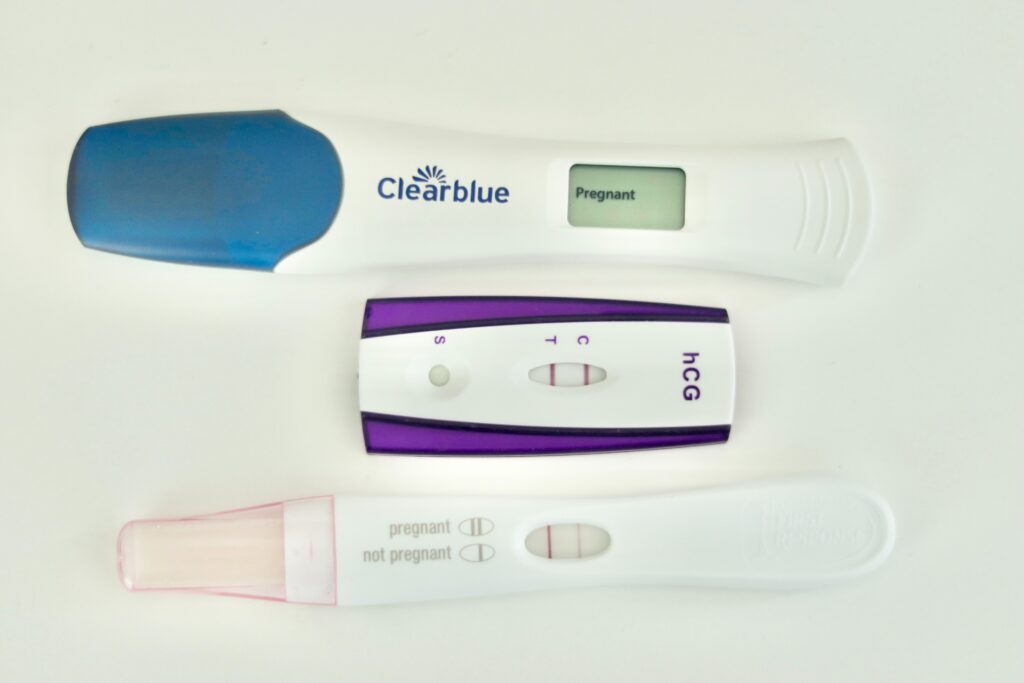Pregnancy Tests How They Work, Types & Accuracy
Have you missed a period or realized any other pregnancy symptoms? Then you may be discussing whether or not to take a pregnancy test! Learn when to take a pregnancy test, how it works, how accurate it is, and much more.

What is a Pregnancy Test?
Pregnancy testing has evolved significantly over the years, from injecting small animals with a woman’s urine to see if the hormones in the urine caused the animal to ovulate or produce sperm to urine testing that did not involve the use of any animals. No matter the form the testing took, the goal was always the same: to look for evidence of hormones produced during pregnancy.
Modern tests look for the presence of Human Chorionic Gonadotropin (hCG), a hormone produced by the placenta, in a woman’s blood or urine to determine pregnancy. Both home testing kits and doctor-ordered tests look for this hormone, with the main difference being that home testing kits only test urine. Doctors may opt for a much more precise and detailed blood test to identify pregnancy and determine how long the pregnancy is.
How does the Pregnancy Test Work?
A pregnancy test measures the presence of the hCG hormone in the body. HCG is referred to as the pregnancy hormone because it is generated by the cells that form the placenta and nourish the developing embryo. It is released when a fertilized egg attaches to the uterus lining. During pregnancy, hCG levels rise. Around 10 to 14 days after conception, hCG can be found in the blood and urine. It reaches its peak between 8 and 11 weeks of gestation.
- A less than five mIU/ml level indicates a negative hCG result.
- A positive pregnancy hCG level is greater than or equal to 25 mIU/ml.
What Are the Early Symptoms Of Pregnancy?
Pregnancy symptoms differ from woman to woman. It varies in intensity and quality; even the same woman may have different symptoms during each pregnancy. Some women develop symptoms during their first trimester of pregnancy, while others develop symptoms later. Absence of menstruation, increased urination, implantation bleeding, weight gain, sore breasts, nausea or morning sickness, mood changes, food aversions, bloating, constipation, and other symptoms may occur early. Pregnancy is a unique experience that is different for each woman.

Types of Pregnancy Tests
The presence of hCG can be detected by two pregnancy tests: urine and blood tests. A typical home pregnancy test at a drugstore tests your urine, whereas a healthcare provider must perform a blood test.
1. Urine Test
A urine test also detects the presence of hCG in your urine. You can take the test by peeing directly onto the stick or using a urine cup. There are a variety of urine tests available, ranging from digital pregnancy tests that display the good news with a plus sign to Urine tests. Urine tests provide immediate results.
A urine test can also be obtained at the local clinic, which has a benefit over home tests; in the clinic, the doctor can instruct you on how to use the test and inform you of the test results.
2. Blood Tests
Blood pregnancy tests, which look for the presence of hCG to determine pregnancy, are generally more accurate and can be used earlier. Blood tests can detect the presence of hCG by 11-14 days of suspected pregnancy. A doctor will perform a blood pregnancy test, take a blood sample, and send it to a lab for testing. Typically, this testing takes a few days. Below are two types of blood pregnancy tests:
- Qualitative hCG Blood Testing
This type of blood test, like urine testing, only looks for the existence of hCG in the blood and returns a yes or no result. Blood tests are thought to be more accurate than urine tests.
- Quantitative hCG Blood Testing
This test looks not only for the presence of hCG but also for the levels of hCG present, indicating not only pregnancy but also how far along the pregnancy has progressed.
How Accurate Are Pregnancy Tests?
Pregnancy tests are 99 percent accurate because they detect the hCG hormone, which is only found in your body when pregnant. If you are not pregnant, your body does not produce hCG, and it will not be detected in pregnancy tests.
The accuracy of your pregnancy test may be affected by factors such as the expiration date and how and when you use it. Using a test after it has passed its expiration date may result in a false negative or false positive result. Using it too soon after conception, mainly if your body is not producing enough hCG for the test to detect, may result in a false negative.
When Should I Visit a Care Provider?
If the pregnancy test is positive, you should make your first prenatal appointment with an Ob/GYN. This doctor will check on the pregnancy’s progress, offer advice, and address any questions or concerns you may have.
If the pregnancy test is negative, but you still believe you are pregnant, you can request second urine or a blood test from your doctor.




